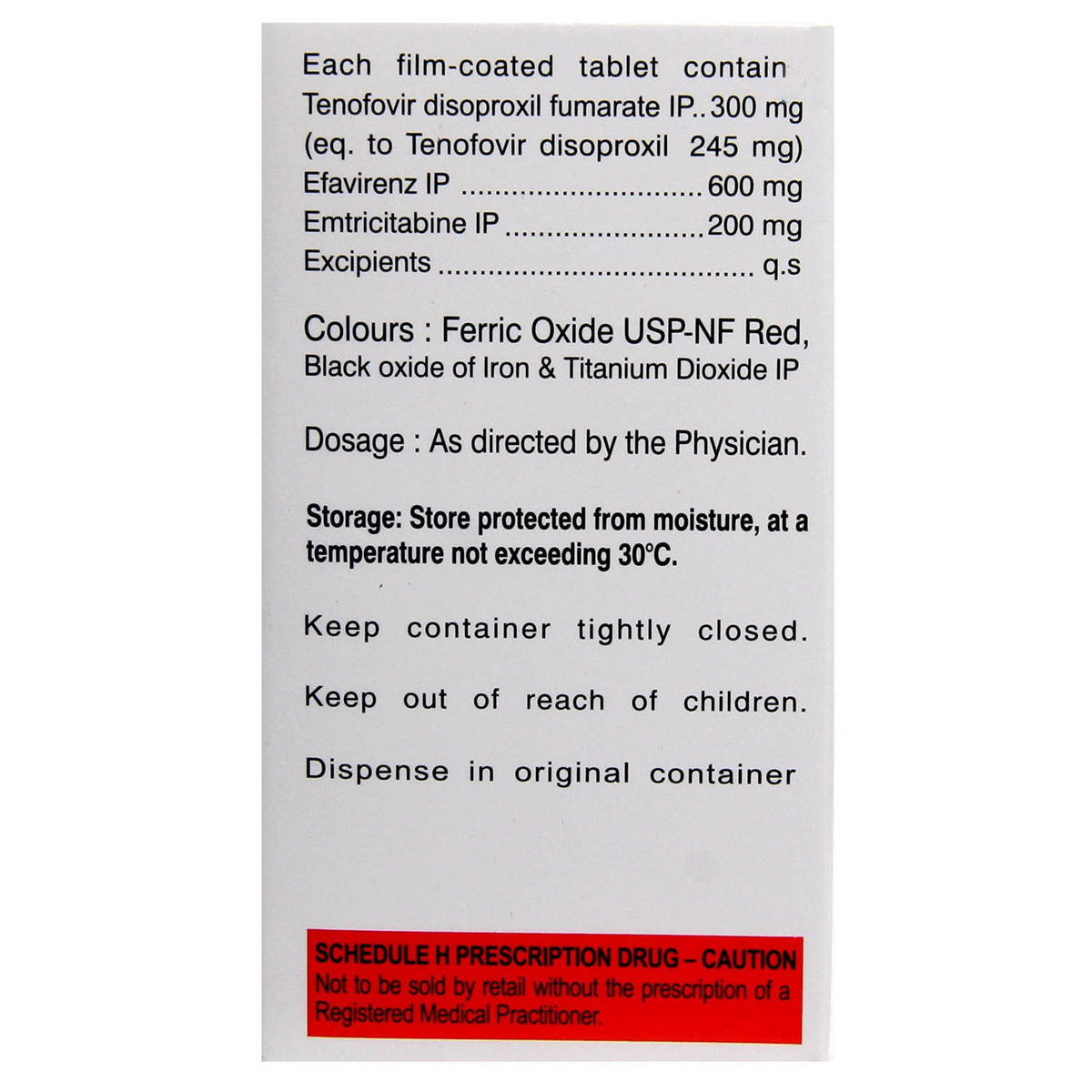Trustiva Tablet



MRP ₹3562.5
(Inclusive of all Taxes)
₹534.4 Cashback (15%)
know your delivery time
Provide Delivery Location
Manufacturer/Marketer :
Consume Type :
Expires on or after :
Return Policy :

Secure Payment

Trusted by 8 Crore Indians

Genuine Products
Therapeutic Class
Country of origin
Manufacturer/Marketer address
Author Details
We provide you with authentic, trustworthy and relevant information
FAQs
Disclaimer
Alcohol
Safe if prescribed
Avoid the consumption of alcohol as it may increase the risk of side effects.
Pregnancy
Consult your doctor
Trustiva Tablet should be used with caution in pregnant women. It is given only if clinically needed and when the benefits outweigh the risk.
Breast Feeding
Consult your doctor
Avoid breastfeeding during treatment with Trustiva Tablet . Please seek medical advice if you have any concerns.
Driving
Safe if prescribed
Trustiva Tablet may cause dizziness, so do not drive or operate heavy machinery if you feel dizzy.
Liver
Consult your doctor
Trustiva Tablet should not be used in patients with severe liver diseases. In mild to moderate conditions, the dose may have to be adjusted by your doctor as required.
Kidney
Consult your doctor
Trustiva Tablet should not be used in patients with moderate to severe kidney diseases as this medicine may affect kidney function. In mild conditions, the dose may have to be adjusted by your doctor as required.
Children
Safe if prescribed
Trustiva Tablet is not recommended for children and adolescents below 18 years old.
Product Substitutes
About Trustiva Tablet
Trustiva Tablet belongs to the class of medicines called ‘antiretroviral agents’ used to treat HIV infection. HIV is a virus that attacks the immune cells of the body leading to decreased immunity. It spreads through body fluids such as semen, vaginal fluid, and blood. Symptoms include fever, chills, rash, night sweats, muscle aches, tiredness, and sore throat that usually last for days to several weeks.
Trustiva Tablet contains Emtricitabine, Tenofovir Disoproxil Fumarate and Efavirenz. Efavirenz is a non-nucleoside reverse transcriptase inhibitor, Emtricitabine is a nucleoside reverse transcriptase inhibitor, and Tenofovir Disoproxil Fumarate is a nucleotide reverse transcriptase inhibitor. They work by inhibiting the reverse transcriptase enzyme production, which is necessary for the multiplication of the viruses. This effect helps to inhibit viral replication.
You should take this medicine exactly as prescribed by the doctor. The common side-effects of Trustiva Tablet are dizziness, headache, diarrhoea, nausea, vomiting, rashes (red spots or blotches, sometimes with blistering and swelling of the skin), and feeling weak. These side effects usually resolve without requiring any medical attention. However, if any of these side effects persist or worsen, inform your doctor immediately.
Trustiva Tablet is not recommended to take Trustiva Tablet if you are allergic to any contents of it. Trustiva Tablet is not recommended for use in lactating mothers, children and adolescents under 18 years of age. Trustiva Tablet may cause dizziness, so do not drive or operate heavy machinery if you feel dizzy. Consumption of alcohol may increase the risk of side effects; therefore, avoid alcohol consumption.
Uses of Trustiva Tablet
Medicinal Benefits Mweb
Key Benefits
Trustiva Tablet belongs to the group of medicines called antiretroviral therapy. Trustiva Tablet contains Emtricitabine, Tenofovir Disoproxil Fumarate and Efavirenz. Trustiva Tablet works by inhibiting the reverse transcriptase enzyme production, which is necessary to multiply the viruses. This effect helps to inhibit viral replication and treats HIV infection.
Directions for Use
Side Effects of Trustiva Tablet
- Dizziness
- Headache
- Diarrhoea
- Nausea
- Vomiting
- Rashes
- Feeling weak
- Loss of appetite
Drug Warnings
Trustiva Tablet should be used with caution in patients with mental illness, fits, and liver diseases. If you notice any signs of infection, inform your doctor immediately. Autoimmune diseases (immune cells attack healthy body tissue) may occur months after the start of the treatment. Inform your doctor if you notice any signs such as muscle weakness, weakness in the hands and feet, palpitations (pounding heart), and tremors. Trustiva Tablet may cause osteonecrosis (death of bone tissue due to a decrease in blood supply to the bone) in some patients. The risk of this disease depends on factors such as length of antiretroviral therapy, alcohol use, steroid use, body mass index (BMI), and immunity. Inform your doctor if you notice joint pain, stiffness, and difficulty in movement, as these symptoms may indicate osteonecrosis.
Drug-Drug Interactions
Drug-Drug Interactions
Login/Sign Up
Taking Rilpivirine with Trustiva Tablet can increase the risk or severity of irregular heart rhythms.
How to manage the interaction:
Taking Rilpivirine with Trustiva Tablet together can result in an interaction, it can be taken if your doctor has advised it. However, if you experience sudden dizziness, lightheadedness, fainting, shortness of breath, chest pain or tightness, rapid heartbeat, or memory loss, contact a doctor immediately. Do not discontinue any medications without consulting a doctor.
When Trustiva Tablet is taken with Lomitapide it can increase the risk or severity of liver damage.
How to manage the interaction:
Taking Trustiva Tablet with Lomitapide is not recommended as it results in an interaction, it can be taken if your doctor has advised it. However, if you notice any symptoms of fever, chills, joint pain or swelling, unusual bleeding or bruising, skin rash, itching, loss of appetite, fatigue, nausea, vomiting, abdominal pain, dark-colored urine, light-colored stools, and/or yellowing of the skin or eyes, you should contact a doctor immediately. Do not stop using any medications without talking to a doctor.
Using ziprasidone together with Trustiva Tablet can increase the risk of an irregular heart rhythm.
How to manage the interaction:
Taking Trustiva Tablet with Ziprasidone is not recommended, but it can be taken together if prescribed by a doctor. However, consult your doctor if you experience sudden dizziness, lightheadedness, fainting, shortness of breath. Do not discontinue any medications without consulting a doctor.
When Trustiva Tablet is taken with Ranolazine, it can lower the levels of Ranolazine.
How to manage the interaction:
Taking Ranolazine with Trustiva Tablet is not recommended as it can result in an interaction, it can be taken if a doctor has advised it. Do not discontinue any medication without consulting a doctor.
Taking Trustiva Tablet with Grepafloxacin can increase the risk or severity of irregular heart rhythms.
How to manage the interaction:
Taking Trustiva Tablet with Grepafloxacin together can result in an interaction, it can be taken if your doctor has advised it. However, if you experience sudden dizziness, lightheadedness, fainting, shortness of breath, chest pain or tightness, rapid heartbeat, or memory loss, contact a doctor immediately. Do not discontinue any medications without consulting a doctor.
Coadministration of Voriconazole with Trustiva Tablet can alter the blood levels and effects of both medications.
How to manage the interaction:
Taking Voriconazole with Trustiva Tablet can be taken if a doctor has advised it. Contact a doctor if you experience vomiting, dizziness, difficulty concentrating. Do not discontinue any medications without consulting a doctor.
Taking Bepridil with Trustiva Tablet can increase the risk or severity of irregular heart rhythms.
How to manage the interaction:
Taking Bepridil with Trustiva Tablet can result in an interaction, it can be taken if your doctor has advised it. However, if you experience sudden dizziness, lightheadedness, fainting, shortness of breath, chest pain or tightness, rapid heartbeat, or memory loss, contact a doctor immediately. Do not discontinue any medications without consulting a doctor.
Using carbamazepine together with Trustiva Tablet may reduce the effect of carbamazepine.
How to manage the interaction:
Taking Trustiva Tablet with Carbamazepine can result in an interaction, it can be taken if your doctor has advised it. However, if you experience any unusual symptoms contact your doctor immediately. Do not stop using any medications without talking to a doctor.
Taking Trustiva Tablet and Cisapride can increase the risk or severity of irregular heart rhythms.
How to manage the interaction:
Taking Trustiva Tablet and Cisapride together can result in an interaction, it can be taken if your doctor has advised it. However, if you experience sudden dizziness, lightheadedness, fainting, shortness of breath, chest pain or tightness, rapid heartbeat, or memory loss, contact a doctor immediately. Do not discontinue any medications without consulting a doctor.
When Trustiva Tablet is taken with Ergometrine, the level of Ergometrine in the body can go up. This can increase the risk or severity of side effects.
How to manage the interaction:
Taking Ergometrine with Trustiva Tablet is not recommended as it can result in an interaction, it can be taken if your doctor has advised it. However, if you experience nausea, vomiting, abdominal pain, diarrhea, headache, dizziness, ringing of the ears, chest pain, palpitation, or irregular heartbeats contact a doctor immediately. Do not discontinue any medications without consulting a doctor.
Drug-Food Interactions
Drug-Food Interactions
Login/Sign Up
Drug-Diseases Interactions
Drug-Diseases Interactions
Login/Sign Up
Drug-Drug Interactions Checker List
- ASTEMIZOLE
- BEPRIDIL
- CISAPRIDE
- ELBASVIR
- GRAZOPREVIR
- ERGOTAMINE
- DIHYDROERGOTAMINE
- ERGONOVINE
- PIMOZIDE
- IMIPRAMINE
- CLOMIPRAMINE
- HYPERICUM PERFORATUM
- VORICONAZOLE
- FLECAINIDE
- METOPROLOL
- IMIDAZOLE
- METHADONE
Habit Forming
Special Advise
- You may still develop infections or other illnesses associated with HIV infection or AIDS. So, people taking Trustiva Tablet should be carefully monitored throughout the treatment.
- You can still infect other people while taking Trustiva Tablet . So, use necessary precautions to avoid infecting others.
- Do not stop taking the medicine unless advised by the doctor. This is because the virus gets multiplied and becomes harder to treat if you stop taking the medication for a short time.
- Women of childbearing potential must use effective contraception while using Trustiva Tablet and for 12 weeks after stopping the treatment.
- Trustiva Tablet may affect kidney function, so monitoring kidney function while using this medicine is advised.
- Trustiva Tablet may decrease phosphate levels in the blood. It may also increase creatine kinase levels in the blood resulting in muscle pain and weakness. Regular monitoring of phosphate levels and creatine kinase levels is advised.
Diet & Lifestyle Advise
- Eat a healthy and balanced diet. Consume vitamin and nutrient-rich food such as vegetables and fruits as it helps to boost your immune system. Opt for lean protein and whole grains.
- Avoid eating raw meat and eggs. Consume properly boiled and cooked meat, poultry, or seafood.
- Eat bland and low-fat foods, and avoid spicy or oily foods if you experience nausea or vomiting.
- Try to reduce emotional and physical stress by spending time with your family or doing whatever makes you happy.
- Drink more fluids and avoid alcoholic beverages to prevent dehydration.
- Make sure you sleep at least 8 hours a day.
All Substitutes & Brand Comparisons
RX
Out of StockTeefavir Tablet
₹3350
(₹91.57 per unit)
5% CHEAPERRX
Out of StockTimeovir-EM Tablet
₹3700
(₹101.13 per unit)
3% COSTLIERRX
Out of StockTeefamc 200mg/300mg/600mg Tablet
Macleods Pharmaceuticals Ltd
₹3892
(₹106.38 per unit)
9% COSTLIER

Have a query?
Buy best Infections & Infestation products by
Cipla Ltd
Macleods Pharmaceuticals Ltd
Alkem Laboratories Ltd
Lupin Ltd
Abbott India Ltd
Sun Pharmaceutical Industries Ltd
Mankind Pharma Pvt Ltd
Micro Labs Ltd
Aristo Pharmaceuticals Pvt Ltd
FDC Ltd
Intas Pharmaceuticals Ltd
Glenmark Pharmaceuticals Ltd
Ipca Laboratories Ltd
Torrent Pharmaceuticals Ltd
Zydus Healthcare Ltd
Biochem Pharmaceutical Industries Ltd
Zuventus Healthcare Ltd
United Biotech Pvt Ltd
Hetero Drugs Ltd
Emcure Pharmaceuticals Ltd
Alembic Pharmaceuticals Ltd
Indoco Remedies Ltd
Fusion Health Care Pvt Ltd
Dr Reddy's Laboratories Ltd
Leeford Healthcare Ltd
Cadila Healthcare Ltd
Wockhardt Ltd
Zydus Cadila
GlaxoSmithKline Pharmaceuticals Ltd
Morepen Laboratories Ltd
Blue Cross Laboratories Pvt Ltd
Cadila Pharmaceuticals Ltd
Converge Biotech Pvt Ltd
Elder Pharmaceuticals Ltd
Hetero Healthcare Pvt Ltd
Pfizer Ltd
AAA Pharma Trade Pvt Ltd
Gufic Bioscience Ltd
Mylan Pharmaceuticals Pvt Ltd
Corona Remedies Pvt Ltd
Wallace Pharmaceuticals Pvt Ltd
Apex Laboratories Pvt Ltd
Medishri Healthcare Pvt Ltd
Akumentis Healthcare Ltd
Alniche Life Sciences Pvt Ltd
Hegde & Hegde Pharmaceutica Llp
Veritaz Healthcare Ltd
Ranbaxy Laboratories Ltd
Koye Pharmaceuticals Pvt Ltd
Shreya Life Sciences Pvt Ltd
Overseas Health Care Pvt Ltd
Biocon Ltd
Indchemie Health Specialities Pvt Ltd
Medley Pharmaceuticals Ltd
Brinton Pharmaceuticals Ltd
J B Chemicals & Pharmaceuticals Ltd
Unifaith Biotech Pvt Ltd
Ajanta Pharma Ltd
Biochemix Health Care Pvt Ltd
Natco Pharma Ltd
Samarth Life Sciences Pvt Ltd
Unichem International
Laborate Pharmaceuticals India Ltd
Unipark Biotech Pvt Ltd
Zymes Bioscience Pvt Ltd
Indiabulls Pharmaceuticals Pvt Ltd
Neon Laboratories Ltd
Vasu Organics Pvt Ltd
DR Johns Lab Pharma Pvt Ltd
East West Pharma India Pvt Ltd
La Renon Healthcare Pvt Ltd
Medgen Drugs And Laboratories Pvt Ltd
Novartis India Ltd
Canixa Life Sciences Pvt Ltd
Icarus Health Care Pvt Ltd
Lincoln Pharmaceuticals Ltd
Celon Laboratories Pvt Ltd
Concept Pharmaceuticals Ltd
Klm Laboratories Pvt Ltd
Nicholas Piramal India Ltd
Systopic Laboratories Pvt Ltd
Yuventis Pharmaceuticals
Capital Pharma
German Remedies Ltd
Pristine Pearl Pharma Pvt Ltd
Unison Pharmaceuticals Pvt Ltd
Aurz Pharmaceutical Pvt Ltd
Clover Health Care Pharma
Kepler Healthcare Pvt Ltd
Allites Life Sciences Pvt Ltd
Auspharma Pvt Ltd
Intra Life Pvt Ltd
Jolly Healthcare
Linux Laboratories Pvt Ltd
Ozone Pharmaceuticals Ltd
Cachet Pharmaceuticals Pvt Ltd
Comed Chemicals Ltd
Delcure Life Sciences Ltd
Fresenius Kabi India Pvt Ltd
Khandelwal Laboratories Pvt Ltd
Frequently Bought Together


_0.jpg?tr=q-85)





